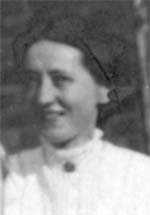Leonora O'Reilly
| Leonora O’Reilly | |
|---|---|
 | |
| Born | 1870 |
| Died |
1927 Brooklyn, New York |
| Occupation | Labor leader |
| Parent(s) | John O'Reilly (father), Winifred (Rooney) O'Reilly (mother) |
Leonora O’Reilly (February 16, 1870 - April 3, 1927) was an American feminist, suffragist, and trade union organizer. She was a founding member of the Women's Trade Union League.
Biography
Leonora O'Reilly was the daughter of John O'Reilly, a printer and member of the Knights of Labor, and Winifred (Rooney) O'Reilly, an Irish-born dressmaker. John O'Reilly died when Leonora was three years old. Upon his death, Winifred O'Reilly supported herself and the child by sewing and taking in boarders.
O'Reilly accompanied her mother to meetings at Cooper Union and her father's friend, Victor Drury, helped instill in her an appreciation for the Italian nationalist Mazzini. O'Reilly counted among her influences radical Catholic priest and social justice advocate Fr. Edward McGlynn and anarchist Peter Kropotkin.
O'Reilly began working in a factory at age 13. At 16 she joined the Knights of Labor, and Winifred O'Reilly soon followed her daughter's lead. Leonora belonged to many organizations composed of both working class and elite men and women. Mentors helped further her education. After attending the Pratt Institute in Brooklyn, O'Reilly and her mother became residents at the Asacog House, a settlement in Brooklyn. She also taught at the Manhattan Trade School.
Only with the financial support of elite women such as Louise Perkins was O'Reilly able to give up manual labor and become a full-time labor organizer with the Women's Trade Union League. In this capacity she served as a volunteer investigator to the Triangle Shirtwaist Factory fire of 1911. O'Reilly served as the president of the Wage Earner’s Suffrage League from 1911-1912.
An ardent socialist, Leonora O'Reilly was a delegate to the 1915 Hague Women's Peace Convention, sailing through mine-laden waters aboard the MS Noordam.[1] She also cooperated with Indian independence organizations and the NAACP. Around 1918, O'Reilly stopped working on behalf of labor and devoted herself to the radical section of American Irish nationalism in 1918.
Leonora and Winifred O'Reilly both made their home in Brooklyn.
Footnotes
- ↑ Dee Garrison, Mary Heaton Vorse: The Life of an American Insurgent. Philadelphia: Temple University Press, 1989; pp. 88-90.